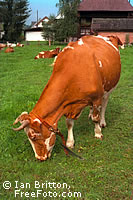Regulation bans antibiotics as growth promoters in animal feed
On 22 July the European Parliament and the European Council adopted a regulation prohibiting antibiotics as growth promoters in animal feed following scientific advice. The regulation seeks to ban substances, which have already been banned from use in human medicine, namely monensin sodium, salinomycin sodium, avilamycin, and flavophospholipol. The decision to prohibit such substances is based on recommendations made by the scientific steering committee (SSC), a scientific body responsible for advising the Commission on matters relating to food safety. In scientific opinions issued on the subject, the committee advised the phasing out of all antibiotics as growth promoters, as well as efforts to preserve animal health. Commissioner for Health and Consumer Protection David Byrne welcomed the final adoption: 'This regulation will strengthen the EU's rules on the safety of animal feed and complete the EU ban on the use of antibiotics as growth promoters. Both these objectives are of major importance to the EU's food safety strategy, and indeed to wider considerations of public health.' The regulation also seeks to strengthen the laws on safety evaluation and marketing authorisation for feed additives. It specifies that the European Food Safety Authority (EFSA) will be responsible for evaluating the safety of additives. On the basis of EFSA's scientific opinions, the Commission will propose a draft regulation, authorising the additive for a ten-year period only. After which, companies must reapply for evaluation and authorisation. The regulation will come into force following its publication in the Official Journal of the European Union later this year.



